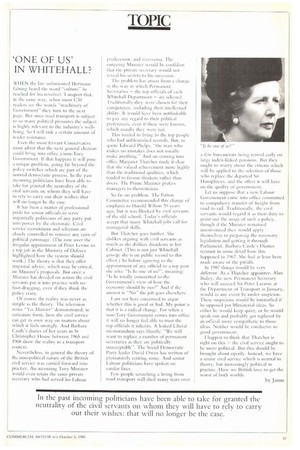'ONE OF US' IN WHITEHALL?
Page 75

If you've noticed an error in this article please click here to report it so we can fix it.
MIEN the late unlamented Hermann Goring heard the word "culture" he reached For his revolver. I suspect that, in the same way, r,vhen most CM readers see the words "machinery of Government" they turn to the next page. But since road transport is subject to so many political pressures the subject is highly relevant to the industry's wellbeing. So I will risk a certain amount of reader resistance.
Even the most fervant Conservative must admit that the next general election could bring into office a non-Tory Government. If that happens it will pose a unique problem, going far beyond the policy switches which are part of the normal democratic process. In the past incoming politicians have been able to take for granted the neutrality of the civil servants on whom they will have to rely to carry out their wishes: that will no longer be the case.
It has been a matter of professional pride for senior officials to serve impartially politicians of any party put into power by the electorate. Civil service recruitment and selection are closely controlled to remove any taint of political patronage. (The row over the irregular appointment of Peter Levine to a top job in the Ministry of Defence highlighted how the system should work.) The theory is that they offer impartial advice, which may be critical, on Minister's proposals. But once a Minister has decided on action the civil servants put it into practice with no foot-dragging, even if they think the policy crazy.
Of course the reality was never as simple as the theory. The television series "les Minister" demonstrated, in caricature form, how the civil service can get its own way on matters about which it feels strongly. And Barbara Castle's diaries of her years in St Christopher House between 1965 and 1968 show the reality in a transport context.
Nevertheless, in general the theory of the non-political nature of the British civil service was carried forward into practice. An incoming 'Fury Minister would even retain the same private secretary who had served his Labour predecessor. and vice-versa. The outgoing Minister would be confident that the private set retary would uot reveal his secrets to his successor.
The problem has arisen from a change in the way in which Permanent Secretaries — the top officials of each Whitehall Department — are selected. 'Iraditionally they were chosen for their competence. including their intellectual ability. It would have been unthinkable TO pay any regard to their political prekrences, even if these were known, which usually they were not.
This tended to bring to the top people who had unblemished records. But, to quote Edward Phelps. "the man who makes no mistakes does not usually make anything." And on coming into office Margaret Thatcher made it clear that she valued achievement more highly than the traditional qualities, which tended to favour thinkers rather than doers. The Prime Minister prefers managers to theoreticians.
So Car no problem. The Fulton Committee recommended this change if emphasis to Harold Wilson 20 years ago, but it was blocked by civil servants of the old school. Today's officials accept that many Whitehall jobs call for mailagerial skills.
But Thatcher goes further. She dislikes arguing with civil servants as much as she dislikes dissidents in her Cabinet. (This is not just Whitehall gossip; she is on public record to this effect.) So before agreeing to the appointment of any official to a top post she asks: "Is he one of us?", meaning: "Is he totally committed to the Government's view of how the economy should be run?" And if the answer is "No" the job goes elsewhere.
am not here concerned to argue whether this is good or bad. My point is that it is a radical change. For when a non-Tory Government comes into office it will no longer feel able to trust the top officials it inherits. A leaked Liberal memorandum says bluntly: We will want to replace a number of permanent secretaries as they are politically unacceptable". The Social Democratic Parry leader David Owen has written of prematurely retiring some. And senior Labour politicians have spoken on similar lines.
Few people scratching a living from road transport will shed many tears over
a few bureaucrats being retired early on large index-linked pensions. But they ought to worry about the criteria which will be applied to the selection of those who replace the departed Sir Humphreys. and the effect it will have on the quality of government.
Let us suppose that a new Labour Government came into office committed to compulsory transfer of freight from road to rail. Traditionally, the civil servants would regard it as their duty to point out the snags of such a policy, though if the Minister remained unconvinced they would apply themselves to prepar;ng the necessary legislation and getting it through Parliament. 13arbara Castle's Diaries recount in some detail how this happened in 1967. She had at least been made aware of the pitfalls.
In 1987 things would he very different. As a Thatcher appointee, Alan Bailey, the new Permanent Secretary who will succeed Sir Peter Lazarus at the Department of Transport in January, would in any event be under suspicion. These suspicions would be intensified if he opposed pet Ministerial ideas. So either he would keep quiet, or he would speak out and probably get replaced by an official more sympathetic to those ideas. Neither would be conducive to good government.
I happen to think that Thatcher is right on this — the civil service ought to be more political. But this should be brought about openly:. Instead, we have a senior civil service which is neutral in theory, but increasingly political in practice. How we British love to get the worst of both worlds.
by Janus












































































































